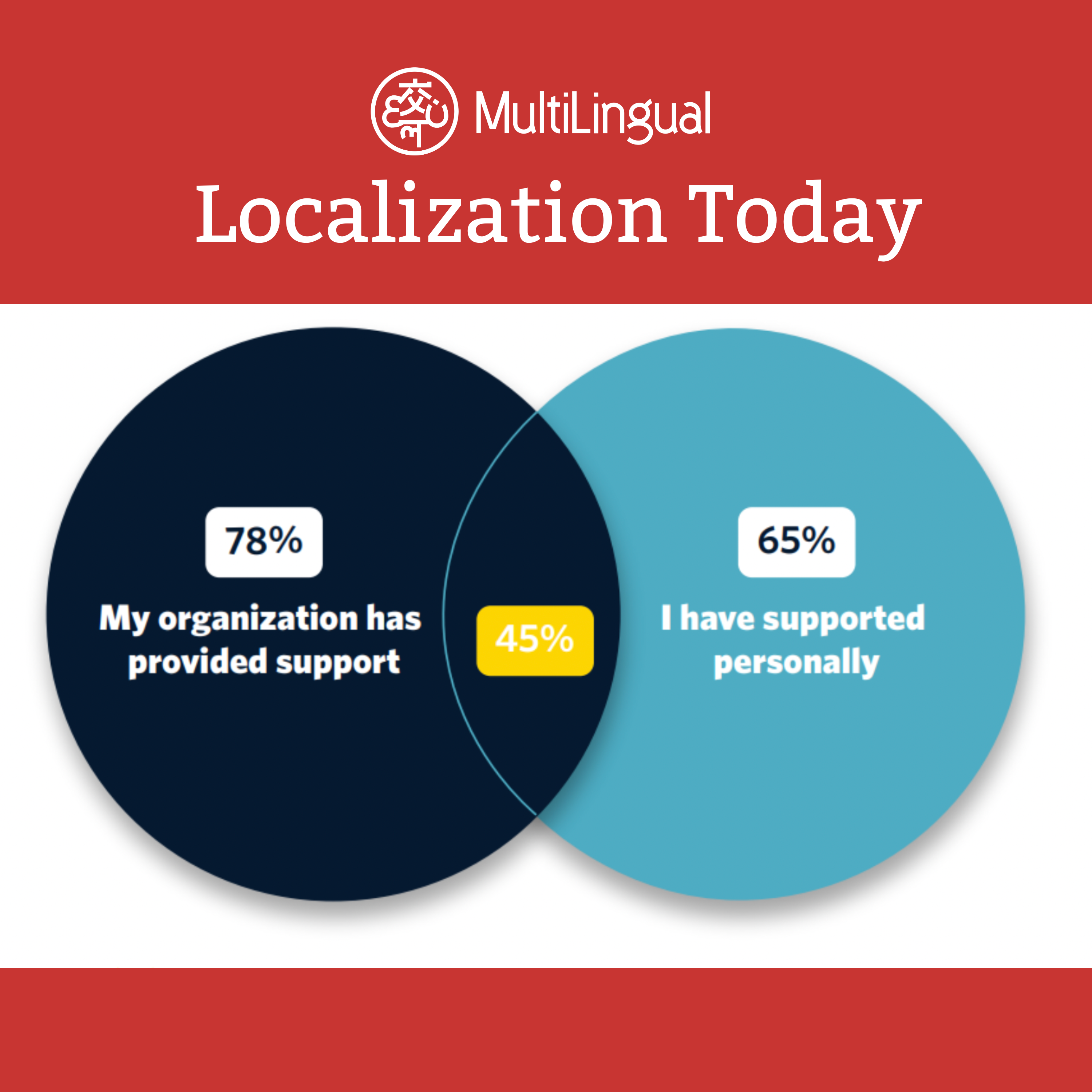Episode Transcript
[00:00:06] Speaker A: This is localization Today, a podcast from multilingual media covering the most relevant daily news in the language industry.
[00:00:16] Speaker B: AI in Globalization the next mass extinction or an evolutionary leap? By Edith Bender Maher and Mimi Moore it the dinosaurs never saw the asteroid coming, and we all know what happened next. For the globalization industry, the introduction of artificial intelligence AI at the beginning of 2023 was like an asteroid impact.
[00:00:40] Speaker C: This revolutionary technology has shaken the foundation.
[00:00:44] Speaker B: Of globalization and changed every aspect of our work lives. With large language models, LLMs, and neural machine translation, NMT entering the market, AI.
[00:00:56] Speaker C: Has the potential to wipe out even the most consolidated and efficient globalization structures. But by addressing the change with an.
[00:01:04] Speaker B: Open mind and insatiable thirst for understanding.
[00:01:07] Speaker C: This technology will present new opportunities for.
[00:01:10] Speaker B: The evolution of globalization, shaking us from our complacency eyes.
[00:01:15] Speaker C: Arrival has forced us to consider new.
[00:01:17] Speaker B: Approaches, and some of them just might.
[00:01:20] Speaker C: Save us from total extinction.
[00:01:22] Speaker B: Take a seat at the table leaning into AI is no longer a choice it's a necessity.
[00:01:28] Speaker C: But sometimes that message doesn't reach important stakeholders. Educating and training business stakeholders to think about the global customer experience from inception helps global initiatives get off on the.
[00:01:40] Speaker B: Right foot and makes globalization an equal.
[00:01:43] Speaker C: Partner in company's strategy. All aspects of a product or service.
[00:01:47] Speaker B: Should be examined through a global lens. Does the product's functionality need to change for different markets?
[00:01:53] Speaker C: Will the user experience need to change for different regions and languages? How will we market our offerings so.
[00:02:00] Speaker B: That it resonates locally?
[00:02:02] Speaker C: What kind of support is needed for our overseas customers? Having a member of the globalization team present to support and facilitate decisions like these can set your global program up for success. Emphasize that proactively including international audiences is more efficient and less costly than trying to retrofit a product or service for overseas markets.
[00:02:23] Speaker B: Later, advocate for NMT, which has become.
[00:02:26] Speaker C: An indispensable part of today's globalization programs.
[00:02:30] Speaker B: Granted, training and customizing your NMT engines can take time, but the time and.
[00:02:36] Speaker C: Cost saving benefits far outweigh the initial work required.
[00:02:39] Speaker B: As with other technologies, NMT is an.
[00:02:42] Speaker C: Investment in your business and, ultimately, your multilingual customers. A state of the art localization infrastructure that supports all content types, integrations, and workflows is equally important.
It's been proven that humans are unable to manage the volumes of content that require translation.
[00:03:00] Speaker B: In today's world, the ability to feed.
[00:03:03] Speaker C: Content from product sales, marketing, and support teams through connectors and integrations into automated workflows helps globalization teams scale as translation volumes continue to grow.
[00:03:15] Speaker B: Learn from others take a curious and proactive approach to AI talk to others about what they are doing and how they are implementing AI into their world. Conferences, peer discussions, and networking are all.
[00:03:29] Speaker C: Good opportunities to compare notes and learn. Remember that opportunities to combine aidriven solutions to provide the best customer experience might.
[00:03:38] Speaker B: Not need to be driven by you.
[00:03:40] Speaker C: Initiating discussions with other groups and departments can open the door to greater collaboration that can benefit your entire organization. Check with stakeholders across your company to learn what AR focused efforts they are interested in or currently have in progress. Create or join a forum for AI use cases to further explore the application of AI for globalization.
Bringing in an Aipowered tool might present a chance to integrate with translation solutions or other applications you likely already have in house.
[00:04:11] Speaker B: To get started, talk to your language suppliers and technology vendors, explore the aid driven solutions they are developing, and evaluate.
[00:04:20] Speaker C: If a new approach to a workflow or quality assurance using AI could be.
[00:04:24] Speaker B: An option for you, explore new directions what can AI do for you?
[00:04:31] Speaker C: Determining that may prevent you from going the way of the dinosaurs.
[00:04:35] Speaker B: Unlike machine translation, AI has given us.
[00:04:39] Speaker C: A wide range of use cases beyond.
[00:04:41] Speaker B: Just translation, AI offers unlimited opportunities for content creation and publishing. AI can also be used to review translated content and perform functional and linguistic testing.
[00:04:55] Speaker C: In these cases, technology can identify and.
[00:04:58] Speaker B: Fix errors, mistranslations, and bugs, leading to a better customer experience for each language.
[00:05:04] Speaker C: And we know that happy customers lead.
[00:05:07] Speaker B: To higher sales, repeat business, and better.
[00:05:09] Speaker C: Buz for your brand in local markets. The standard process of localization has many.
[00:05:15] Speaker B: Elements and is typically not standard at all.
[00:05:18] Speaker C: AI automation can create workflows for different.
[00:05:21] Speaker B: Content types, languages, and quality levels, and.
[00:05:25] Speaker C: It can introduce levels of process customization that were unthinkable only a few years ago.
Long gone are the days in which project managers manually send or process files for localization.
AI now offers an opportunity to further.
[00:05:40] Speaker B: Automate repetitive and routine tasks, freeing up.
[00:05:44] Speaker C: Time to focus on things that require a human touch and add value to each market. Evaluate your own systems and technology for.
[00:05:51] Speaker B: Gaps that AI could fill.
[00:05:53] Speaker C: Is your current empty solution offering a combination of high quality, fast go to market, and positive customer experience?
[00:06:01] Speaker B: Would an aid driven solution be a better fit?
[00:06:04] Speaker C: The first step is identifying places to.
[00:06:07] Speaker B: Weave AI into your existing processes and continuously refine and build automation.
Leave the change there's a lot to.
[00:06:16] Speaker C: Learn about AI, especially since development is ongoing and changes seem to come every day. As with any transition, change management for stakeholders and localizers must be considered as.
[00:06:28] Speaker B: They adjust to working with AI.
[00:06:30] Speaker C: Considering the rapid pace at which AI.
[00:06:32] Speaker B: Is evolving, the vision for how it.
[00:06:34] Speaker C: Will be used in your organization may.
[00:06:36] Speaker B: Be unclear and change unexpectedly.
[00:06:40] Speaker C: Leadership will be needed to emphasize flexibility and help people understand that the vision is a work in progress.
[00:06:47] Speaker B: Most importantly, the real win of using AI must be identified and communicated, as well as the risks of sitting out what will be lost by not employing AI survive and thrive.
[00:07:00] Speaker C: Globalization is an important strategic vehicle to enable and enhance the customer experience.
The evolution of globalization services and technology advancements over the past 20 years have.
[00:07:13] Speaker B: Proven that, but we now have an.
[00:07:15] Speaker C: Opportunity and a challenge in front of.
[00:07:17] Speaker B: Us and we need to get ready.
[00:07:19] Speaker C: The world of globalization is experiencing a.
[00:07:22] Speaker B: Big paradigm shift and it will evolve and adjust.
[00:07:26] Speaker C: This can already be seen in new technologies like avatars that can speak any language and algorithms that can translate into.
[00:07:33] Speaker B: Various languages, tones and styles.
[00:07:36] Speaker C: The possibilities seem to be endless. By embracing change and leaving complacency behind, we can avoid sharing the fate of the dinosaurs and instead head into a new and exciting future. This article was written by Tim Brooks, the founder of the Undangered Alphabets Project.
[00:07:54] Speaker B: And author of undangered alphabets.
[00:07:56] Speaker C: His current project is to create a red list of the world's writing systems, identifying every script currently at use in the world and assessing its degree of health or vulnerability.
This article was written by Edith Bendermerher, director of Globalization at NiTAP, based in San Jose, California. Her team oversees localization at NITAP under.
[00:08:20] Speaker B: A centre of excellence responsible for the.
[00:08:23] Speaker C: Strategic planning of globalization across all departments.
[00:08:26] Speaker B: Including delivery, innovation, uptake, and return of the globalization investments and Mimi Moore, with.
[00:08:34] Speaker C: 25 years of experience in localization, project management, account management, and marketing for globalization teams, LSPs and Global B, two B software companies. She is program manager of content and social media for women in localization and owns Netherlands based Wolfson Housewriting.
[00:08:54] Speaker B: Originally published in multilingual magazine, issue 225, March 7, 2024.
[00:09:02] Speaker A: Thank you for listening to localization today. To subscribe to multilingual magazine, go to multilingual.com subscribe.


